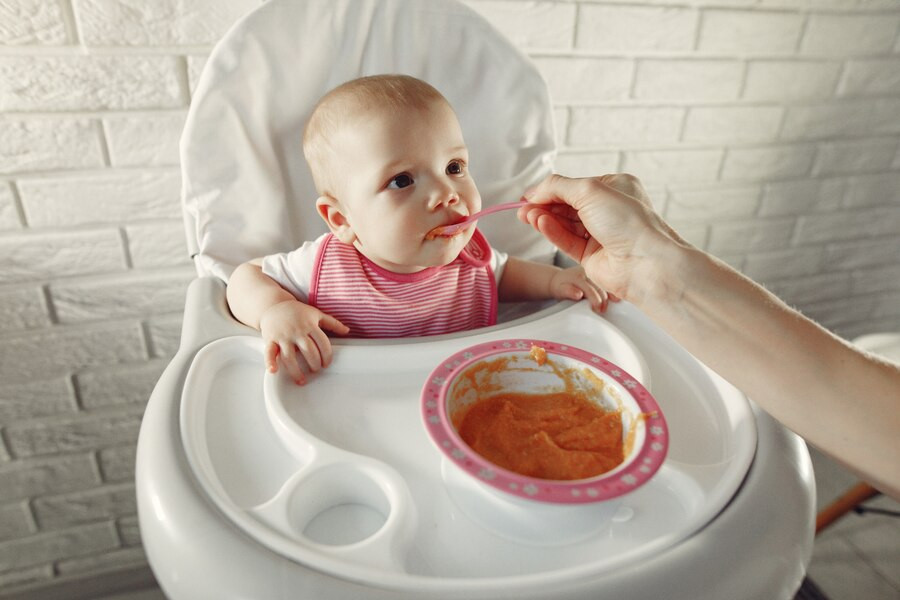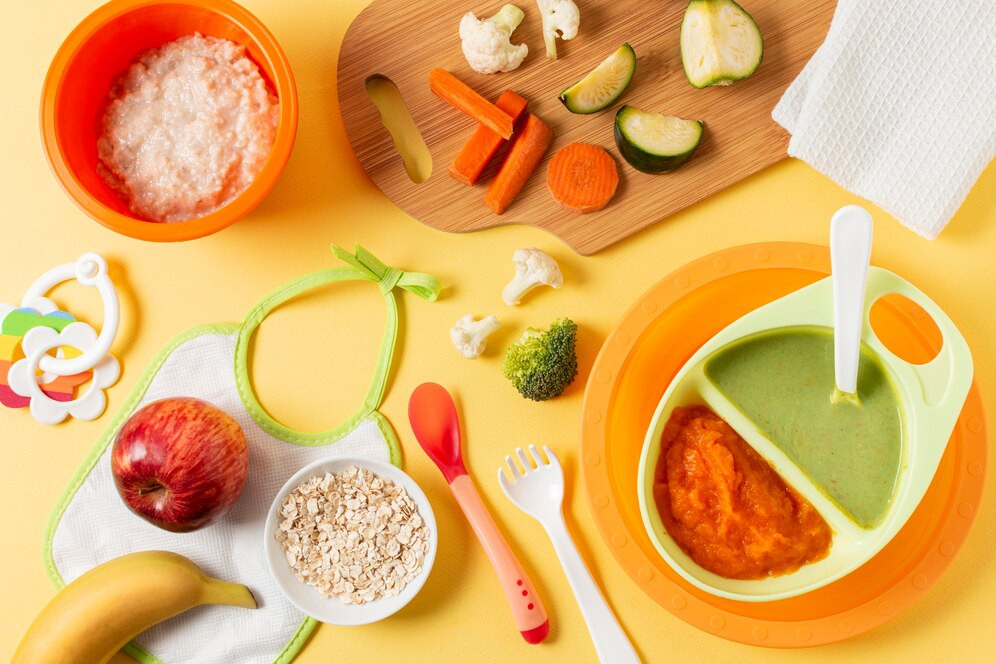Saat bayi mulai makan makanan padat pertamanya atau yang biasa disebut MPASI, hal ini menjadi satu tantangan baru untuk orang tua. Beberapa bayi mungkin pilih-pilih makanan, menolak makanan, mengalami masalah pencernaan, atau bahkan alergi makanan.
Ketahui masalah apa saja yang paling sering terjadi saat bayi mulai MPASI, sehingga Anda bisa mempersiapkannya dengan baik. Ketahui pula bagaimana cara mengatasinya.
Masalah Umum saat Bayi Mulai MPASI
Bayi menjulurkan lidah saat makan
Adalah refleks ekstrusi yang merujuk pada bayi menjulurkan lidah saat diberi makanan padat. Refleks ini adalah mekanisme perlindungan yang secara alami ditunjukkan bayi untuk mencegah bayi tersedak dengan mendorong keluar benda asing dari mulutnya.
Bila bayi menunjukkan refleks ini, campur makanan padat dengan ASI, susu formula, atau air putih untuk membuatnya lebih cair dan mudah ditelan oleh bayi. Hal ini bisa membantu membuat makanan terasa lebih familiar sehingga bayi lebih nyaman untuk mencobanya.
Sebaiknya perkenalkan makanan dalam jumlah kecil dengan menggunakan sendok kecil atau ujung jari, agar bayi dapat beradaptasi secara bertahap.
Baca Juga: Ide MPASI Kaya Kandungan Zat Besi
Bayi memuntahkan makanan
Bayi memuntahkan makanan karena beberapa alasan seperti, tidak menyukai makanan yang diberikan, tidak merasa nyaman, atau sudah kenyang. Bayi yang sudah kenyang biasanya akan menunjukkan tanda-tanda kenyang seperti menutup mulut, memalingkan kepala, atau mendorong makanan keluar. Segera akhiri sesi makan dan biarkan anak beristirahat pada saat ini.
Namun, apabila makan baru dimulai dan dia sudah memuntahkan makanan, coba variasi makanan yang berbeda atau ubah konsistensinya. Jika bayi terus memuntahkan makanan meskipun sudah dicoba beberapa kali, jangan memaksanya untuk makan. Memaksa bayi untuk makan dapat menciptakan pengalaman negatif terkait makan yang bisa berdampak jangka panjang.
Bayi selalu memalingkan kepala
Bayi memiliki cara mereka sendiri untuk memberi tahu orang tua tentang apa yang mereka butuhkan. Berpaling atau menolak sendok bisa jadi salah satu caranya.
Bayi yang kenyang atau lelah akan berpaling dari makanan. Jika Anda merasa bayi belum cukup makan dan dia terlihat sangat mengantuk, cobalah memberinya makan setelah tidur siang atau ketika bayi lebih segar. Cari tahu juga, apakah bayi sedang tidak enak badan, mengalami tumbuh gigi, terganggu akan suara TV atau distraksi lainnya.
Jangan memaksa bayi untuk makan, hargai keputusannya untuk tidak makan agar bayi bisa belajar mengenali rasa lapar dan kenyang.
Baca Juga: Berapa Banyak Seharusnya Porsi MPASI untuk Bayi?
Bayi mengalami ruam setelah makan makanan tertentu
Jika Anda melihat ruam di sekitar mulut atau pantat bayi setelah makan makanan tertentu, misalnya telur atau ikan laut, kemungkinan telah terjadi reaksi alergi. Amati pula gejala alergi lain seperti muntah, sesak napas, atau pembengkakan. Bila bayi menunjukkan tanda-tanda reaksi alergi parah seperti kesulitan bernapas atau menelan, segera bawa bayi untuk mendapatkan pertolongan medis di rumah sakit.
Jika ruam atau gejala lainnya muncul setelah memperkenalkan makanan baru, segera hubungi dokter anak Anda.
Bayi menolak makan sendiri
Suatu hal yang wajar apabila bayi menolak makan sendiri. MPASI adalah bagian dari proses pembelajaran yang memerlukan waktu dan kesabaran.
Anda bisa memberikan sendok dengan pegangan pendek agar lebih mudah digenggam oleh tangan kecilnya yang baru belajar. Sajikan makanan yang berwarna cerah dan dipotong panjang agar lebih mudah untuk diambil dan dimasukkan ke mulut.
Memulai MPASI memang selalu menantang, Anda perlu pendekatan yang sabar menghadapi setiap tantangannya. Bila Anda kesulitan dalam memberi makan bayi dan bayi selalu menolak sejak waktu makan pertamanya, kembali konsultasikan dengan dokter untuk mendapatkan tips dan saran yang tepat.
Anda juga bisa berkonsultasi dengan dokter melalui aplikasi Ai Care yang bisa diunduh di App Store atau Play Store.
Mau tahu informasi seputar kehamilan, menyusui, kesehatan wanita dan anak-anak? Cek di sini, ya!
- dr Nadia Opmalina
Maria Masters (2021). Common Baby Feeding Problems After You Introduce Solids. Available from: https://www.whattoexpect.com/first-year/baby-feeding/baby-feeding-problems-introducing-solids
Raising Children (2023). Introducing solids: why, when, what and how. Available from: https://raisingchildren.net.au/babies/breastfeeding-bottle-feeding-solids/solids-drinks/introducing-solids
Kids Health (2021). When Can My Baby Start Eating Solid Foods?. Available from: https://kidshealth.org/en/parents/solid-foods.html
Healthy Children (2022). Starting Solid Foods. Available from: https://www.healthychildren.org/English/ages-stages/baby/feeding-nutrition/Pages/Starting-Solid-Foods.aspx
Ashley Marcin (2018). What Is Extrusion Reflex?. Available from: https://www.healthline.com/health/parenting/extrusion-reflex
Kids Health (2021). Feeding Your Newborn. Available from: https://kidshealth.org/en/parents/feednewborn.html
Gina Shaw (2023). Feeding Baby: How to Avoid Food Allergies. Available from: https://www.webmd.com/parenting/baby/introducing-new-foods












